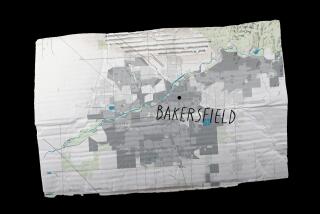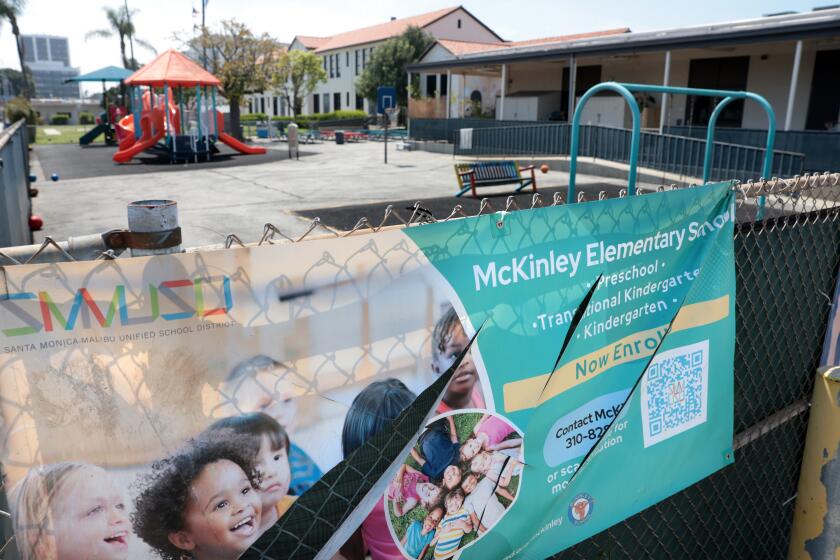Nailing a trade at Rosie the Riveter High
Students are welding the old to the new at Rosie the Riveter High School.
The Long Beach charter school was created in 2007 to help prepare teenage girls for careers as welders, plumbers, carpenters, electricians and other trades.
Today, its 50-member student body includes girls and boys, but its organizers still attempt to break down barriers for women seeking careers in what largely remains a man’s world.
“It’s about trying to change the way society looks at women,” said Lynn Shaw, who helped create Rosie the Riveter High. “We just feel that women should have an equal opportunity.”
Shaw, who lives in Long Beach, teaches electrical technology at Long Beach City College.
She heads the board of directors for Women in Non Traditional Employment Roles, a nonprofit economic development group that sponsors the charter school.
She knows plenty about nontraditional jobs.
“I’ve worked as a miner at a limestone mine in the desert, a steelworker in Pennsylvania and a longshoreman in San Francisco,” she said. “For me, it was all about the money. Women in nontraditional jobs earn 20% to 40% more than women in what are considered ‘traditional’ women’s jobs. That’s $1 million over a lifetime.”
She had previously worked as a waitress and was dismayed at the welcome she received from male co-workers at the mine, the steel mill and on the docks.
“It would start out, ‘Oh my God, a girl’s on the job!’ I was a threat to men -- I somehow downgraded their job,” she said. “I got tired of being the only woman on the job.”
Determined to change that, Shaw earned a doctorate in electrical engineering, pursued a teaching career and became an advocate for vocational equity.
Rosie the Riveter High got its name almost by accident.
When Shaw’s group assembled copies of its charter application to submit to the Long Beach Unified School District, someone suggested that the paperwork be accompanied by small lunch boxes featuring the likeness of the heroic World War II-era icon.
Rosie was a fictional character who symbolized thousands of women who entered the American workforce to replace men who had joined the military.
She is depicted on a motivational poster created in 1942 for the Westinghouse company by artist J. Howard Miller as a determined-looking woman who is rolling up her sleeves to get to work. “We Can Do It!” the poster declares.
“The idea had been to call the school Youth Opportunity Charter High School or something like that,” Shaw said. “But that sounded really boring.”
The group’s executive director, Alexandra Torres Galancid, suggested that they name it after Rosie instead.
These days, reproductions of the Rosie the Riveter poster are everywhere at the high school, which is in a donated building at the AES Alamitos power station at 690 Studebaker Road.
The school is accepting new students for the upcoming semester now through Dec. 18.
In addition to hands-on vocational instruction taught by instructors at nearby community colleges, pupils take a full range of academic courses required by the state to graduate from high school.
The school’s five in-house teachers add to the curriculum by including topics such as technical math and language skills required in the workplace.
English teacher Robin Scott said she plans to have her students research and write a paper about Rosie the Riveter.
“They’ll explore whether she was a real person or a made-up person and what her role was during the war,” Scott said. “They’ll connect it with where we are right now, when we’re in another war.”
Students say they are proud to be associated with Rosie the Riveter and the “We can do it” attitude.
“Coming here has opened my mind up. Before, I had thought I might become a special-ed teacher. I never thought about a nontraditional job,” said 18-year-old senior Alaina Servin, a senior who has begun her third year at the school.
“They encourage you to do a lot of things here. My goal now is to work in an oil refinery. It won’t be easy, but I’m a strong person and they make good money there.”
Senior Yolanda Morga, 17, who heard of Rosie the Riveter from her grandparents, said she appreciates earning college-level credit for the vocational courses and the one-on-one teacher time that the school offers. But she plans to become a pediatrician, not a craftsman.
Neville Allen II, also 17, said his friends don’t bat an eye when he tells them the name of the school he attends. He said he does not plan a career in the building trades either.
“I want to be a writer who deals with pop culture,” Allen said. “My vocational studies are going to help give me ideas to write about.”
More to Read
Start your day right
Sign up for Essential California for news, features and recommendations from the L.A. Times and beyond in your inbox six days a week.
You may occasionally receive promotional content from the Los Angeles Times.







